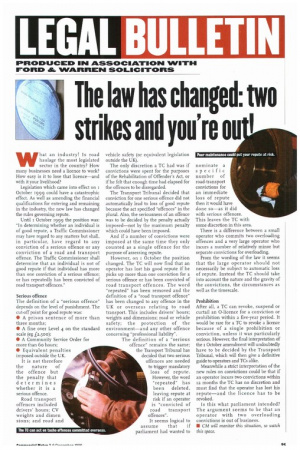LEGAL ULLET N
Page 27

If you've noticed an error in this article please click here to report it so we can fix it.
IPFLOOILICEE) IN ASSOCIATION WITH FO ID & 1/VAFIFIENI SOILICrrorts
The law has changed: two strikes and you're ou
What an industry! Is road haulage the most legislated sector in the country? How many businesses need a licence to work? How easy is it to lose that licence—and with it your livelihood?
Legislation which came into effect on a October 1999 could have a catastrophic effect. As well as amending the financial qualifications for entering and remaining in the industry, the new law has changed the rules governing repute.
Until a October 1999 the position was -In determining whether an individual is of good repute, a Traffic Commissioner may have regard to any matters but shall, in particular, have regard to any conviction of a serious offence or any conviction of a road and transport offence. The Traffic Commissioner shall determine that an individual is not of good repute if that individual has more than one conviction of a serious offence; or has repeatedly has been convicted of road transport offences."
Serious offence The definition of a "serious offence" depends on the level of punishment. The cut-off point for good repute was: • A prison sentence of more than three months; • A fine over Level 4 on the standard scale (eg L2,5oo); • A Community Service Order for more than Go hours; • Vquivalent penalties imposed outside the UK.
It is not therefore the nature of the offence but the penalty that determines whether it is a serious offence.
Road transport offences included drivers' hours; CV weights and dimen sions; and road and vehicle safety (or equivalent legislation outside the UK).
The only discretion a TC had was if convictions were spent for the purposes of the Rehabilitation of Offender's Act, or if he felt that enough time had elapsed for the offences to be disregarded.
The Transport Tribunal decided that conviction for one serious offence did not automatically lead to loss of good repute because the act specified "offences" in the plural. Also, the seriousness of an offence was to be decided by the penalty actually imposed—not by the maximum penalty which could have been imposed.
And if a number of convictions were imposed at the same time they only counted as a single offence for the purpose of assessing repute.
However, on i October the position changed. The TC will now find that an operator has lost his good repute if he picks up more than one conviction for a serious offence or has been convicted of road transport offences. The word "repeated" has been removed and the definition of a "road transport offence" has been changed to any offence in the UK or overseas relating to road transport. This includes drivers' hours; weights and dimensions; road or vehicle safety; the protection of the environment—and any other offence concerning "professional liability".
The definition of a "serious offence" remains the same; the Transport Tribunal has decided that two serious offences are needed to trigger mandatory loss of repute.
However, the word "repeated" has been deleted, leaving repute at risk if an operator is "convicted of road transport offences".
It seems logical to assume that if parliament had wanted to nominate a specific number of road-transport convictions for an immediate loss of repute then it would have done so—as it did with serious offences. This leaves the TC with some discretion in this area.
There is a difference between a small operator who commits two overloading offences and a very large operator who incurs a number of relatively minor but separate convictions for overloading.
From the wording of the law it seems that the large operator should not necessarily be subject to automatic loss of repute. Instead the TC should take into account the nature and the gravity of the convictions, the circumstances as well as the timescale.
Prohibition
After all, a TC can revoke, suspend or curtail an 0-licence for a conviction or prohibition within a five-year period. It would be rare for a TC to revoke a licence because of a single prohibition or conviction, unless it was particularly serious. However, the final interpretation of the r October amendment will undoubtedly have to be decided by the Transport Tribunal, which will then give a definitive guide to operators and TCs
Meanwhile a strict interpretation of the new rules on convictions could be that if an operator incurs two convictions within 12 months the TC has no discretion and must find that the operator has lost his repute—and the licence has to be revoked.
Is this what parliament intended? The argument seems to be that an operator with two overloading convictions is out of business.
• CM will monitor this situation, so watch this space.








































































































